SUBJECT: THE IRAQNAM QUAGMIRE
SOURCE:
JUAN WILSON juanwilson@mac.com
POSTED:
31 October 2006 - 7:30am HST
Put a fork in it. Were done.
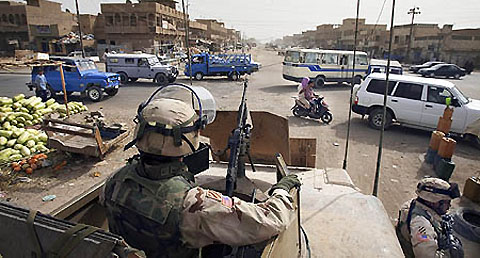
US troops in control of streest in Sadr
City have been asked to take down some check points
[Editor's
note: the following are typical blog comments to the material
above on 31 October 2006 in The
Huffington Post] by
mark kleiman by
wesinohio
|
SUBJECT: THE IRAQNAM QUAGMIRE
SOURCE: JUAN WILSON juanwilson@mac.com
POSTED:
23 October 2006 - 9:00pm HST
US troops in negotiations with insurgents
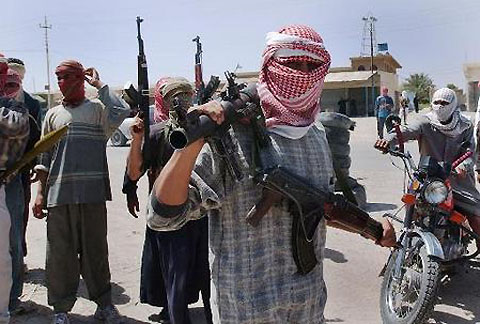
cooperation with Sunni insurgents may be
America's best hopr for Iraq
[Editor's Note: The unravelling of the war in Iraq continues. James Baker has been brought in to take George Bush to the woodshed, and give him a thrashing, after the election. The neo-con crazies (led by Rumsfeld) have lost the ball to the Iranian Shiites and Jimbo representents the old fashioned Arab Sunni school of geopolitical domination (Aramco). Looks like they deals for
Iraq are about to get dealt.] EXIT
OPTIONS • Coalition troops withdraw gradually to neighbouring countries, returning to hotspots if necessary. Military advisers stay to train Iraqi forces •
Partition into federal autonomous regions. Backed by some Shia
and Kurdish groups, but not by Hojatoleslam Moqtada al-Sadr
and Sunnis |
SUBJECT: THE IRAQNAM QUAGMIRE
SOURCE: KEN TAYLOR taylork021@hawaii.rr.com
POSTED: 28 September 2006 - 9:00pm HST
US troops
in Iraq are Tehran's 'hostages'
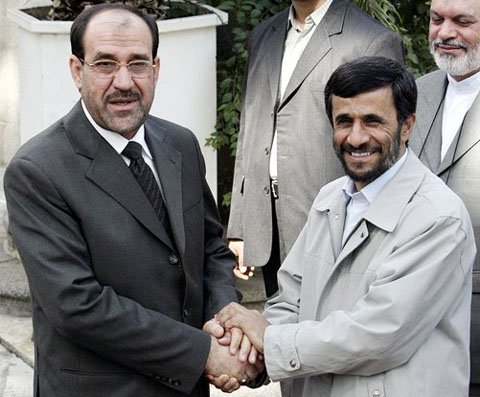
Iraqi Prime Minister Nouri al-Maliki shakes
hands with Iranian President Mamoun Ahmadinejad 9/13/06
| by
Gareth Porter on 22 September 2006 in Asia
Times Online For many months, the administration of US George W Bush has been complaining that Iranian meddling in Iraq is a threat to the country's stability and to US troops. The irony of this publicity campaign over Tehran's alleged bid to undermine the occupation is that Iran may well be the main factor holding up a showdown between militant Shi'ites and US forces. The underlying reality in Iraq, which the Bush administration does not appear to grasp fully, is that the United States is now dependent on the sufferance of Iran and its Iraqi Shi'ite political-military allies to continue the occupation. Three and a half years after the occupation began, the US military is no longer the real power in Iraq. As the chief of intelligence for the US Marine Corps revealed in a recent report, US troops have been unable to shake the hold that Sunni insurgents have on the vast western province of al-Anbar. But the main threat to the occupation comes not from the Sunni insurgents but from the militant Iraqi Shi'ite forces aligned with Iran, led by Muqtada al-Sadr's Mehdi Army. The armed Shi'ite militias are now powerful enough to make it impossible for the US occupation to continue. Gone are the days when the US military could be so cavalier about Muqtada's forces that it deliberately provoked a major confrontation with him in Najaf in April 2004. That was when he was believed to have 10,000 poorly trained troops. Since then, US officials have avoided giving any estimate of the Mehdi Army's strength. But according to a report published last month by London's Chatham House, which undoubtedly reflected the views of British intelligence in Iraq, the Mehdi Army may now be "several hundred thousand strong". Even if that estimate vastly overstates his troop strength, it reflects the sense that Muqtada has the strongest political-military force in the country - because of the loyalty that so many Shi'ites have to him. The Mehdi Army controls Sadr City, the massive Shi'ite slum in eastern Baghdad that holds half the capital's population. But even more important, perhaps, it holds sway in the heavily Shi'ite southern provinces, and as Muqtada knows well, that gives him a strategic position from which to bring the US military to a standstill. Patrick Lang, former head of human-intelligence collection and Middle East intelligence at the Defense Intelligence Agency, explained why in an important analysis in the Christian Science Monitor of July 21: US troops must be supplied by convoys of trucks that go across hundreds of kilometers of roads through this Shi'ite heartland, and the Mehdi Army and its allies in the south could turn those supply routes into a "shooting gallery". Lang noted that the supply trucks are driven by South Asian or Turkish civilians who would immediately quit. And even if the US military used its own troops to protect the routes, they would be vulnerable to ambushes. "A long, linear target such as a convoy of trucks is very hard to defend against irregulars operating in and around their own towns," Lang wrote. It would not require a complete cutoff of supplies to make the US position untenable. A significant reduction in those supplies would begin a "downward spiral", according to Lang. US officials and the government of Prime Minister Nuri al-Maliki realize that Muqtada is too powerful to be dealt with by force. When Iraqi forces raided Sadr City last month accompanied by US advisers, Maliki denounced the operation on television and promised "this won't happen again". Last week, a "senior coalition official" admitted to the Washington Post that "there's not a military solution" to the Mehdi Army. But the Bush administration and the military in Iraq still appear to believe that there is some way to contain Muqtada's power. They have not yet accepted that Muqtada has both the intention and the capability to bring down the US occupation. Yet Muqtada has made no secret of his intentions. In an interview with the Washington Post published on August 11, his top deputy, Mustafa Yaqoubi, said, "If we leave the decision to [the Americans], they will not leave. They'll stay. To get the occupiers to leave, they need [to make] some sacrifice." The Shi'ites have never forgiven the US for its "betrayal" in calling for an uprising against Saddam Hussein after the 1991 Gulf War and then standing by as Saddam slaughtered thousands of Shi'ite militants who took up arms. Most of them never supported the current occupation in the first place. Wayne White, principal Iraq analyst for the US State Department's Bureau of Intelligence and Research, recalls that polling done by the department soon after the US occupation began but never made public showed that a clear majority of Shi'ites were already opposed to it. Growing anger at US military atrocities, combined with a rising sense of power in the Shi'ite community, have made Muqtada's readiness for a showdown with the US occupation forces enormously popular. By last spring, the political atmosphere in the Shi'ite community was seething with hatred of the US and support for war against the occupation forces. In a May 6 story, Borzou Daraghi of the Los Angeles Times quoted a spokesman for the Ayatollah Mohammed Taqi Moderessi in Karbala, known in the past as a moderate, as saying the slogan at Friday prayers is "Death to America." The ayatollah reported that people were preparing for a military showdown with the US, saying, "The Americans won't leave except by the funerals of their sons." If Muqtada and his followers are already preparing for a showdown with the US occupation forces, the only factor that appears to be restraining the Mehdi Army now is Iran. After all, Tehran's interest lies not in forcing an immediate withdrawal of US forces, but in keeping them in Iraq as virtual hostages. The potential threat to US forces in Iraq in retaliation for an attack on Iran is probably Tehran's most effective deterrent to such an attack. Meeting with Maliki last week, Iran's Supreme Leader Ayatollah Ali Khamenei said, "We hope that one day the Iraqi nation will regain its rightful place and take the financial and human capital of the country into their own hands with the withdrawal of the foreigners." At the University of Virginia a week earlier, former president Mohammad Khatami answered a question on Iraq by saying the immediate departure of US troops would create instability. It would be surprising if Iran were not urging Muqtada to hold off on attacking the occupation forces until after the Bush administration had either reached a broad political agreement with Tehran or had been replaced in two years by an administration that would do so. Only Iran's ability to persuade Muqtada to hold off on his effort to end the occupation can prevent a violent confrontation between Shi'ite militants and the occupation forces. But Bush's advisers may still not understand how fundamentally the power equation in Iraq has shifted. "They don't think like that," Patrick Lang said. "They think they are still in charge." Gareth Porter is an historian and national security policy analyst. His latest book, Perils of Dominance: Imbalance of Power and the Road to War in Vietnam, was published in June 2005. Majority
of Iraqis Approve of Attacks on US Troops, Why Are We Still There? |
SUBJECT: 911 FIFTH ANNIVERSARY
SOURCE: JUAN WILSON juanwilson@mac.com
POSTED: 24 September 2006 - 9:00pm HST
The Iraq
War has Fueled Terrorism Across The Globe
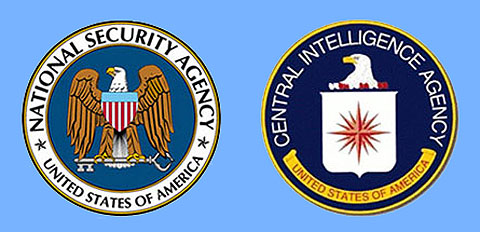
Study
of Iraq War Stirs Strong Political Response by Philip
Snenon & Mark Mazzetti on 24 September 2006 in the NYT
|
SUBJECT: 911 FIFTH ANNIVERSARY
SOURCE: JUAN WILSON juanwilson@mac.com
Situation Called Dire in West Iraq
11 September
2006 - 9:00pm HST
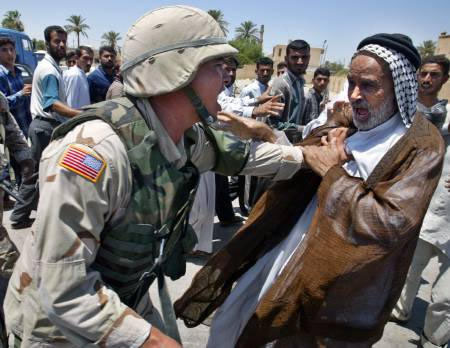
|
Pa